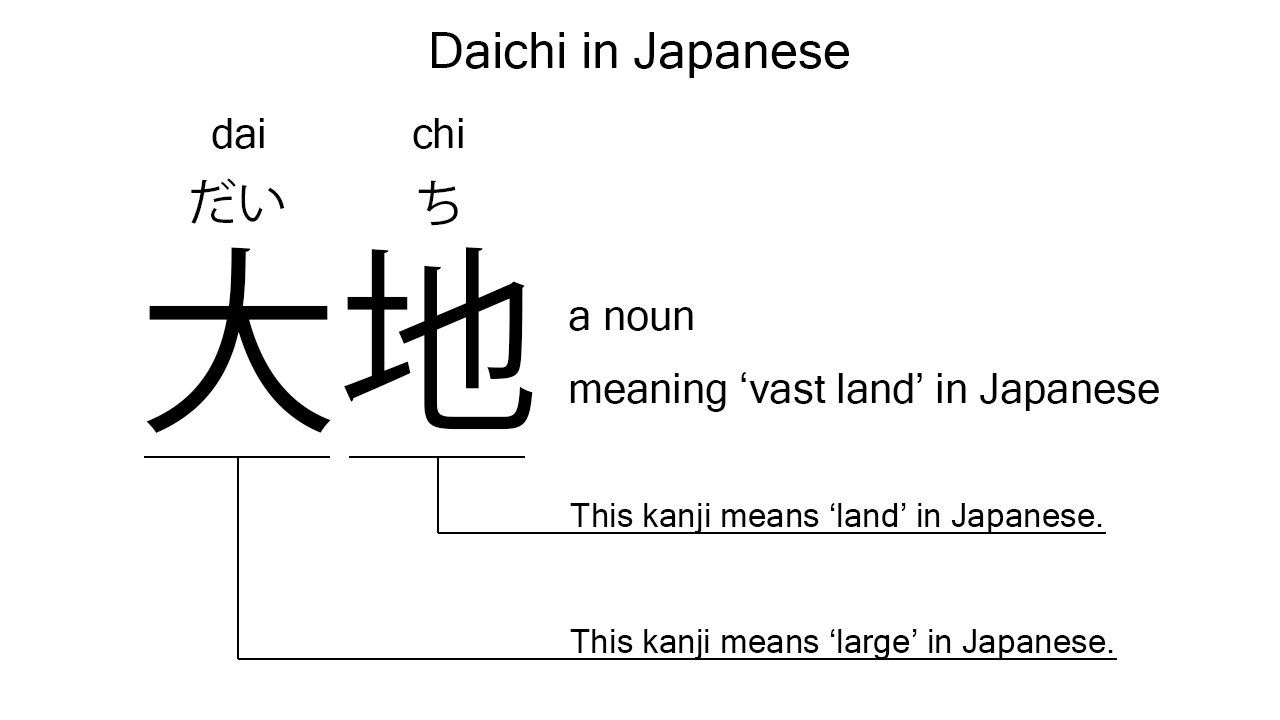What does “daichi” mean in Japanese?
Native speakers say “daichi” to mean ‘vast land’ in Japanese. Perhaps, some Japanese learners know this word as it is sometimes used in Japanese movies, songs, novels, manga, anime, and the like. In this blog post, however, I will explain it in detail based on its kanji expression. And also, I will explain how to use it through example sentences. My explanations would help Japanese learners understand “daichi” more clearly. Then, let’s get started!
Contents
Definition and meanings of “daichi”
Let me start with the definition and meanings of “daichi”.
- daichi – 大地 (だいち) : a noun meaning ‘vast land’ in Japanese. Depending on the context and situation, this can also mean ‘ground’ or even ‘earth’.
Normally, native speakers use this noun to refer to vast land in Japanese. It’s also worth mentioning here that this noun can be used as a male name in Japan.
The definition and meanings are not that difficult, I think. To understand this noun more clearly, however, let me explain its kanji characters in detail, one by one.
Daichi in kanji
The kanji expression of “daichi” consists of the following two kanji characters:
- 大 : a kanji character used to mean ‘large’, ‘big’, or such in Japanese.
- 地 : a kanji character used to mean ‘land’, ‘ground’, or such in Japanese.
These two kanji characters tell us that “daichi” literally means ‘large land’ in Japanese. This literal interpretation is very close to the actual meanings.

When we meet new kanji expressions, we should check their kanji characters in detail to understand their meanings clearly and deeply. In many cases, kanji characters tell us a lot about the meanings of the expressions they form. Actually, here, we could get the better understanding of “daichi” through the detailed kanji check above.
So far, I’ve explained the definition and meanings of “daichi” together with its kanji characters. Then, let me explain how to use it through the example sentences below.
Example #1: how to say “vast land” in Japanese
kono daichi de watashi wa shizen wo kanjiru – この大地で私は自然を感じる (このだいちでわたしはしぜんをかんじる)
In this vast land, I feel nature.
Below are the new words used in the example sentence.
- kono – この : a determiner used before a noun referring to a thing close to the speaker. In the example, this is used before “daichi” to say “this vast land” in Japanese.
- de – で : a case particle used to say where someone does something. In the example, this is used after “kono daichi” to say where the speaker feels nature.
- watashi – 私 (わたし) : a pronoun meaning ‘I’ in Japanese.
- wa – は : a binding particle working as a case marker or topic marker. In the example, this works after “watashi” to make the subject in the sentence.
- shizen – 自然 (しぜん) : a noun meaning ‘nature’ in Japanese.
- wo – を : a case particle used to make the object word in a sentence. In the example, this is used after “shizen” to make the object in the sentence.
- kanjiru – 感じる (かんじる) : a verb meaning ‘to feel’ in Japanese.
This is a typical usage of “daichi”. In this example, it works together with “kono” to say “this vast land” in Japanese.
Example #2: another usage of “daichi”
boku wa kono utsukushii daichi ga suki desu – 僕はこの美しい大地が好きです (ぼくはこのうつくしいだいちがすきです)
I love this beautiful vast land.
Below are the new words used in the example sentence.
- boku – 僕 (ぼく) : a pronoun meaning ‘I’ in Japanese. This is used mainly by boys and young males.
- utsukushii – 美しい (うつくしい) : an i-adjective meaning ‘beautiful’ in Japanese.
- ga – が : a case particle used to make the subject word or the object word in a sentence. In the example, this is used after “kono utsukushii daichi” to make the object in the sentence.
- suki – 好き (すき) : the stem part of the na-adjective, “sukina”, which means ‘favorite’ in Japanese. Native speakers, however, often use this as an individual word to mean ‘to like’ or ‘to love’. In the example, actually, this is used to mean ‘to love’.
- desu – です : an auxiliary verb used after a noun or adjective to make it polite. Probably, this is well known as a part of Japanese desu form. In the example, this is used after “suki” to make it sound polite.
This is another typical usage of “daichi”. When we want to mean ‘vast land’ in Japanese, this noun is always a good option.
Summary
In this blog post, I’ve explained the definition and meanings of “daichi” in detail based on its kanji expression. And also, I’ve explained how to use it through the example sentences. Let me summarize them as follows.
- daichi – 大地 (だいち) : a noun meaning ‘vast land’ in Japanese. Depending on the context and situation, this can also mean ‘ground’ or even ‘earth’. These two kanji characters literally mean ‘large land’ in Japanese. This literal interpretation is very close to the actual meanings. It’s also worth mentioning here that this noun can be used as a male name in Japan.
Hope my explanations are understandable and helpful for Japanese learners.